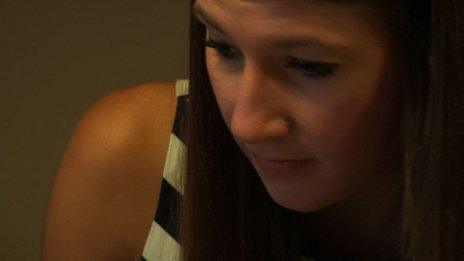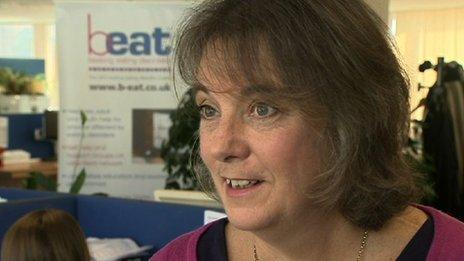Eating disorder patient: Heartbreaking wait for help
- Published
Susan Ringwood, Chief Executive of Beat, says early treatment is key
A charity is calling on the government to do more to help people with eating disorders.
Beat, external says people are being left on waiting lists for treatment for too long.
It says this makes their conditions worse and in some cases, can prove fatal.
The government insists it wants mental health patients, including those with eating disorders, to be treated equally to patients with physical problems.
Hayley Martin first developed an eating disorder when she was 15.
A few years later, it got so bad that she had to drop out of university.
Hayley Martin first developed an eating disorder when she was 15
She had anorexia and bulimia and says it took over her life.
Hayley says: "My binges could last for six to 10 hours. Then the next day I would starve myself."
By the time she asked for help, she was severely underweight.
'Heartbreaking' wait
Hayley thought that when she asked her doctor to refer her for specialist help, it would be the start of her recovery.
However, she says it took six months until she was properly assessed. She was then told it would be another 18 months before she could start treatment.
"You're just left stranded," she says. "You think, 'If I make myself worse they might take more notice'."

Hayley continued to binge and then starve herself and eventually tried to take her own life.
"I'd been on the waiting list for about a year and a half, and I just wanted to kill myself," she says.
"You think you're better off dead. I just wanted out, I wanted help."
Early treatment
If Hayley had been suffering from a physical illness, she would have had a legal right to start treatment within no more than 18 weeks. There is no such guarantee for mental health problems.
Susan Ringwood is the chief executive of eating disorder charity, Beat. She says early treatment is key.

Susan Ringwood is calling for clear waiting times
"Eating disorders are fatal in up to 20% of cases," she says. "That's the highest death rate of any mental illness.
"We know that when people have to wait a long time for treatment, their illness can get worse. In the most serious cases, people's lives can be lost."
The charity surveyed 331 people with eating disorders in August 2013 about their treatment.
"We were shocked to find that 26% of the people we spoke to had waited more than six months," Ms Ringwood adds.
"We want clear waiting times to be set, so people can know when their treatment is going to start."
'Very urgent'
The government has asked NHS England to review waiting times for people with mental health illnesses.
Care Minister Norman Lamb says this has to be a "very urgent priority".
"In mental health, we don't even know how long people are waiting," he says. "That's why this survey is of great value, because it demonstrates the seriousness of the problem.
"I want to get to a point where, by 2015, we introduce access standards, so that people know how long they should be expected to wait as a maximum."
But he admits that it's not going to be easy.
"I don't know whether I will achieve it yet, but I'm determined to try to secure that."
Lives at risk
Hayley Martin never saw an eating disorder specialist.
She says help from her GP, friends and family helped her sort through her problems and that she has been in recovery for almost a year now.
But she is adamant that if she'd got help when she really needed it, things would not have become so bad.
She says: "People's lives are at risk. It is a really serious illness. It's just as important as any other health issue."
Follow @BBCNewsbeat, external on Twitter